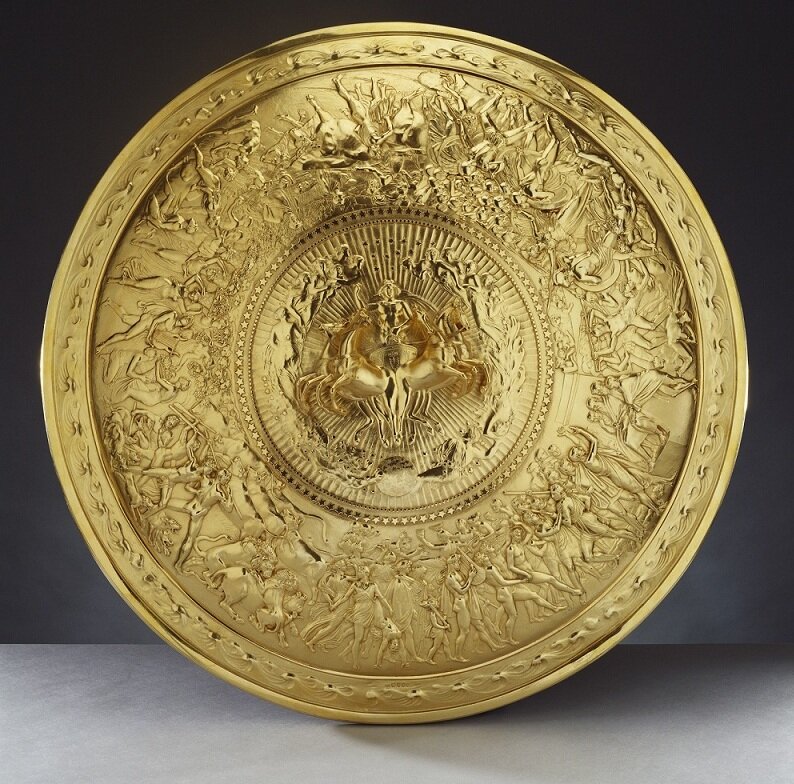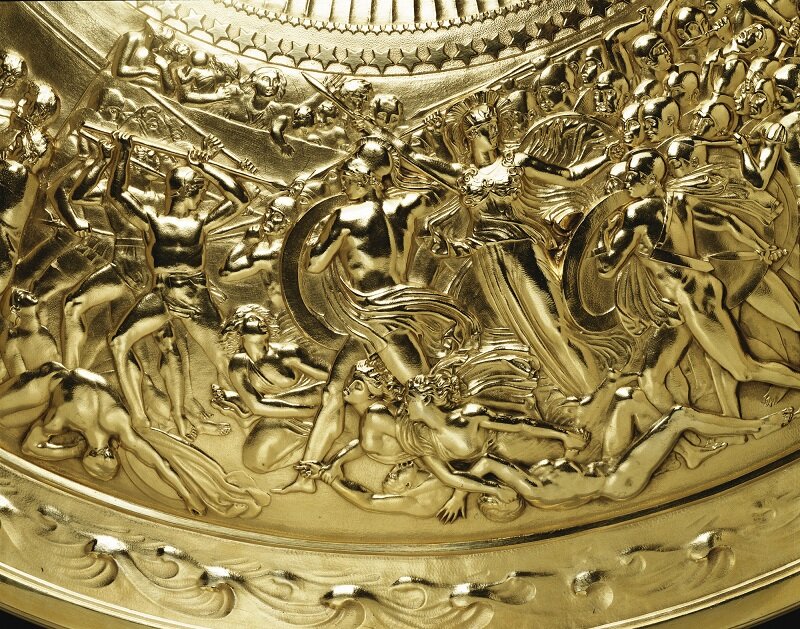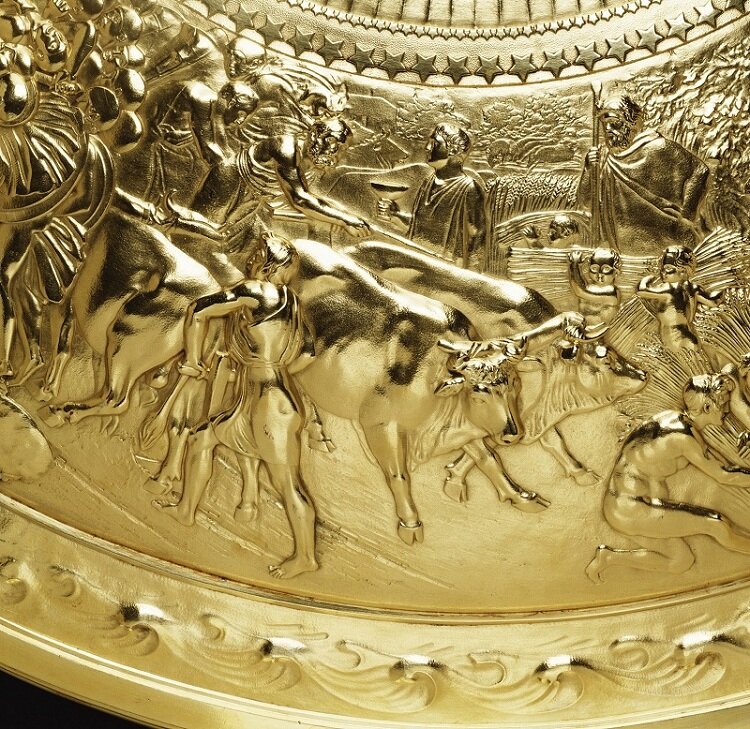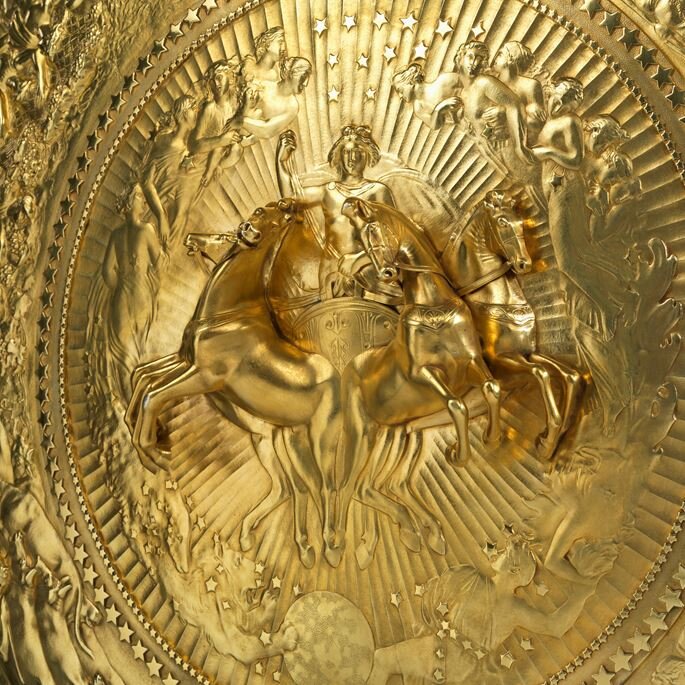The Shield of Achilles, immortalized in Homer’s Iliad (Book 18, lines 478–608), is one of the most iconic artifacts in ancient Greek mythology and literature. Crafted by the god Hephaestus at the request of Achilles’ mother, Thetis, this shield is much more than a mere piece of armor. It is a vivid representation of the world—combining narrative brilliance with artistic craftsmanship—and serves as a reflection of the cosmos, human life, and divine influence. Its creation and the vivid description of its imagery in Homer’s epic transcend the physical world of combat, delving deep into the philosophical and existential themes that shape the human condition.
The Creation and Symbolism of the Shield
The Shield of Achilles is forged by Hephaestus, the divine blacksmith, at the behest of Thetis, who seeks to arm her son after the tragic death of his beloved companion, Patroclus, at the hands of Hector. The death of Patroclus, which marks a pivotal moment in the Iliad, compels Achilles to return to battle in a fit of vengeance and grief. The shield, therefore, is not just a physical protection for Achilles, but also a symbol of his journey toward redemption and wrathful justice.

The shield itself is a masterwork of divine craftsmanship. Hephaestus adorns it with intricate, detailed imagery that goes far beyond its intended purpose of battle defense. Homer’s description showcases scenes that represent the entirety of human existence—depictions of cities at war and peace, agricultural fields, and even the heavens themselves. This imagery forms a microcosm of the universe, illustrating the balance between the forces of war, peace, life, and death, and offering profound insight into the cyclical nature of existence.
Ekphrasis: The Art of Description
Homer’s portrayal of the Shield of Achilles is one of the earliest and most famous examples of ekphrasis, a literary device where a work of art is described in great detail to convey its deeper meaning. In this case, Homer does not simply narrate the making of the shield or describe its beauty; he gives the shield life through his words, allowing it to become a dynamic element within the epic. Through ekphrasis, Homer emphasizes the significance of the shield as both a literal and symbolic object, framing it as a reflection of Achilles’ inner conflict, the broader human struggle, and the power of the gods in shaping fate.

This vivid description transcends the idea of the shield as a mere piece of armor. It becomes a living symbol of the relationship between the mortal and divine, showing how both human actions and divine influence intertwine in shaping destiny. The shield is imbued with meaning beyond its role in the battlefields of the Iliad.
War, Peace, and the Eternal Struggle
The Shield of Achilles presents a world that encompasses both the violence of war and the tranquility of peace. The shield is engraved with scenes of soldiers in battle, but it also portrays peaceful images of marriage, harvests, and festivals. In this way, Homer shows the duality of human existence—the constant tension between war and peace, destruction and creation, death and life.

This duality is especially important when considering the theme of mortality that runs throughout the Iliad. The shield’s portrayal of everyday human life—agriculture, festivals, weddings—reminds us of the transient beauty of life in contrast to the brutal, unrelenting nature of war. The depiction of peaceful scenes alongside battle scenes serves to underscore the fleeting nature of existence and the inevitable cycles of violence that punctuate it.
The Shield as a Mirror of Achilles’ Inner Journey
The symbolic importance of the Shield of Achilles lies not just in its artistic features but in how it reflects the personal journey of its owner. Achilles’ rage at the loss of Patroclus, his descent into vengeful fury, and his eventual confrontation with Hector all mirror the themes portrayed on the shield.
In a way, the shield becomes an external representation of Achilles’ internal conflict. Just as the shield encapsulates both war and peace, so too does Achilles struggle with his own inner contradictions: the desire for vengeance and the longing for reconciliation, the impulse to destroy and the yearning for a return to a more peaceful existence. Through the shield, Homer explores the complexity of human emotions and the ways in which individuals are shaped by both their internal struggles and external circumstances.
The Lasting Legacy of the Shield
The significance of the Shield of Achilles extends beyond its immediate role in the Iliad. It becomes a timeless symbol of heroism, mortality, and the human condition. Homer’s vivid description of the shield serves not only as a reflection on the epic themes of war, fate, and divine intervention, but also as a precursor to modern notions of the hero’s journey.

The shield is not simply a symbol of Achilles’ power in battle; it is also a reminder of the heroic quest for meaning in a world dominated by the capricious will of the gods. The imagery on the shield invites reflection on the interplay between human agency and the forces of fate. It challenges us to think about the nature of heroism, the inevitability of death, and the search for purpose in a world full of uncertainties.
In this way, the Shield of Achilles becomes more than just an object of warfare—it is a profound meditation on life itself. As both an artistic and literary artifact, it continues to inspire and provoke thought across generations, offering a glimpse into the ancient Greek worldview and the eternal questions that continue to define humanity’s understanding of itself and the world around it.
Conclusion
The Shield of Achilles is a masterwork that resonates with timeless themes, bridging the worlds of art, mythology, and philosophy. As a creation of divine craftsmanship, it not only serves as a tool for war but also embodies the very essence of the human experience—facing the complexities of existence, the inevitability of conflict, and the search for meaning in a world shaped by both mortal and divine forces. Homer’s depiction of the shield remains a powerful reflection on the cycles of life, the struggles between fate and free will, and the eternal quest for understanding the place of humanity in the cosmos.

